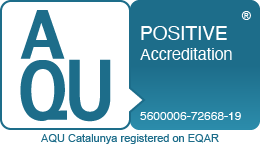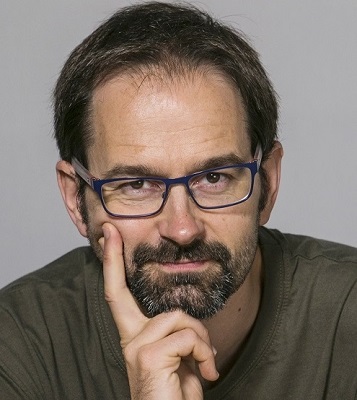Doctoral Programme in Network and Information Technologies
Presentation
The scientific production and training capacity of the researchers in the different UOC groups involved in IT, multimedia and telecommunications justify the creation of a specific doctoral programme, with a separate identity, to consolidate research and knowledge exchange activities in this area. Therefore, the IT, Multimedia and Telecommunications (IMT) Department at UOC is offering this Doctoral programme in Network and Information Technologies.
The research lines and groups associated with the programme are organized around network and information technologies, focusing on areas such as information security, distributed systems, open and decentralized networks, multimedia systems and applications, e-learning technology, information systems, computer vision, and software and service engineering. Several of these research lines are being pursued at the University's two research centres: Internet Interdisciplinary Institute (IN3) and the
The scientific production and training capacity of the researchers in the different UOC groups involved in IT, multimedia and telecommunications justify the creation of a specific doctoral programme, with a separate identity, to consolidate research and knowledge exchange activities in this area. Therefore, the IT, Multimedia and Telecommunications (IMT) Department at UOC is offering this Doctoral programme in Network and Information Technologies.
The research lines and groups associated with the programme are organized around network and information technologies, focusing on areas such as information security, distributed systems, open and decentralized networks, multimedia systems and applications, e-learning technology, information systems, computer vision, and software and service engineering. Several of these research lines are being pursued at the University's two research centres: Internet Interdisciplinary Institute (IN3) and the eLearning Innovation Center (eLinC).
The IMT Department, with the support of the two research centres linked to the University, is focusing its attention on scientific development in the area of network and information technology through a higher-education offering (including undergraduate, masters and doctorate degrees) that corresponds to the aforementioned working lines and in response to current demand.
Several research groups in the IMT Department offer research projects funded by competitive calls for proposals at the national and international level, have earned recognition from quality agencies within the university system, include accredited teaching faculty and have an extensive list of publications in prestigious scientific journals and conferences that validate their research trajectory.
Over thirty of the lecturers in the programme hold doctorates and are qualified to direct doctoral theses within the Network Information Technologies Doctoral Programme. Moreover, the two aforementioned research centres provide grant programmes (UOC grants) for visiting lecturers, resident lecturers, post-doctoral researchers and invited lecturers, among others, that promote collaboration with groups and researchers from other universities and contribute added value to the doctoral programme.
Competencies
The doctoral programme develops the following basic competencies (as per Spain's Royal Decrees RD 99/2011 and RD 576/2023):
C1. Systematic understanding of a field of study and mastery of the research skills and methods related to this field.
C2. Conceiving, designing or creating, putting into practice and adopting a substantial research or creation process.
C3. Contributing to expanding the frontiers of knowledge through original research.
C4. Developing a critical analysis and assessment and synthesizing new and complex ideas.
C5. Communicating with the academic and scientific community and with society in general regarding the student's areas of knowledge, employing the formats and languages habitually used in their international scientific community.
C6. Fostering scientific, technological, social, artistic or cultural progress in a knowledge-based society, in academic and professional settings.
C7. Fostering open science and citizen science (in accordance with Article 12 of Spain's Organic Law 2/2023, of 22 March) so as to contribute to the status of scientific knowledge as a common good, with assessment of the doctoral student's performance of interdisciplinary activities relating to the different aspects of open science and citizen science, and the development of skills in both disciplines through microcredentials or similar.
Admission profiles
For admission to this PhD programme, it is recommended that candidates meet the following requirements:
1) Holding one of the following UOC university master's degrees (duly verified):
● University Master's Degree in Multimedia Applications
● University Master's Degree in Free Software
● University Master's Degree in Information and Communication Technology Security
● University Master's Degree in Computer Vision
● University Master's Degree in Bioinformatics and Biostatistics
● University Master's Degree in Computational and Mathematical Engineering
This PhD programme also accepts students who have studied other university master's degrees in the field of technology, whether they did so at the UOC or at other universities. Admission shall entail the associated bridging courses, which shall depend on each given case.
In the case of qualifications issued by the UOC, given the subject matter, those holding the following university master's degrees may be admitted to the PhD programme:
● University Master's Degree in Computer Engineering
● University Master's Degree in Telecommunications Engineering
2) Candidates who are not nationals of an English-speaking country must demonstrate a level of English equal to or above B2 according to the Common European Framework of Reference for Languages (CEFR).
Candidates applying for the PhD programme on a part-time (online) basis who cannot demonstrate that they possess the required level will be admitted to the programme if they possess a B1 level and undertake to attain a B2 level before submitting their research plan at the end of the first year. If they do not attain this level, it will not be possible to approve their research plan, with the consequences established in the UOC's doctoral programme regulations.
If students apply for a grant, they must demonstrate that they possess a level of English equal to or greater than B2 at the time of making their application. In any case, candidates' ability to clearly explain their academic projects in English shall also be taken into account by the academic committees as part of the selection process.
The UOC's Centre for Modern Languages offers English courses to attain the minimum levels required for admission to its range of PhD programmes (B2). If a candidate has attended school or completed the entirety of a bachelor's or master's degree programme (or an equivalent condition for admission to the PhD programme) with English as the language of instruction in a country in which English is an official language, they shall be recognized as possessing a level equivalent to that required for admission to the programme.
The UOC can help candidates demonstrate their command of English by providing an online test for this purpose. A score of between 65 and 78 in the test demonstrates a level equivalent to B2 according to the Common European Framework of Reference for Languages (CEFR).
Candidates may also prove their English language skills by means of another official qualification demonstrating an equivalent or higher level than that required.
3) Preferably with prior experience in the production of academic output (although doctoral students with little prior research experience, such as those who have recently obtained their university master's degree, may also be admitted).
4) Possession of a clear interest in carrying out their doctorate in a field of knowledge related to this programme and its research lines and groups.
The academic committee of the programme will consider each application individually, allowing the admission of doctoral students with other profiles in exceptional cases in which it is considered justified.
Career opportunities
The main career opportunities for people with this PhD are teaching and research, in academia and business.
Official qualification
The UOC's Doctoral Programme of Network and Information Technologies is a programme that has been approved by the Spanish Universities Council, and its implementation has been authorized by the Government of Catalonia, in accordance with current legislation.
The UOC's doctoral programmes have full academic validity throughout Spain; where such is the intention, they are qualifications to perform regulated professions, in accordance with the regulations applicable in each case.
The certificates for these programmes are issued together with a Diploma Supplement (DS), providing details of what the student studied, their results, the professional competencies obtained and the qualification's level in the Spanish higher education system; the aim of this is to facilitate recognition of the qualification and promote students' and graduates' mobility within the European Higher Education Area (EHEA).
In other countries, the validity of the official university qualifications issued by the UOC will depend on each specific country's education laws.
Official qualification
The UOC's Doctoral Programme of Network and Information Technologies is a programme that has been approved by the Spanish Universities Council, and its implementation has been authorized by the Government of Catalonia, in accordance with current legislation.
The UOC's doctoral programmes have full academic validity throughout Spain; where such is the intention, they are qualifications to perform regulated professions, in accordance with the regulations applicable in each case.
The certificates for these programmes are issued together with a Diploma Supplement (DS), providing details of what the student studied, their results, the professional competencies obtained and the qualification's level in the Spanish higher education system; the aim of this is to facilitate recognition of the qualification and promote students' and graduates' mobility within the European Higher Education Area (EHEA).
In other countries, the validity of the official university qualifications issued by the UOC will depend on each specific country's education laws.
-
Start
23 Sep 2026
-
Online
100%
-
Admission to the welcome area: March 19, 2025
-
Languages: Catalan, Spanish, English
-
Official qualification
Fully online method
World's first ever online university
Personalized guidance and support
-
The UOC, Spain's best online university
We are rated the best online university in Spain by the main university quality rankings.
Programme quality
The quality of this degree programme is endorsed by the Catalan University Quality Assurance Agency (AQU), which ensures that rigorous standards, including those demanded by the EHEA, are met.
AQU quality seal



